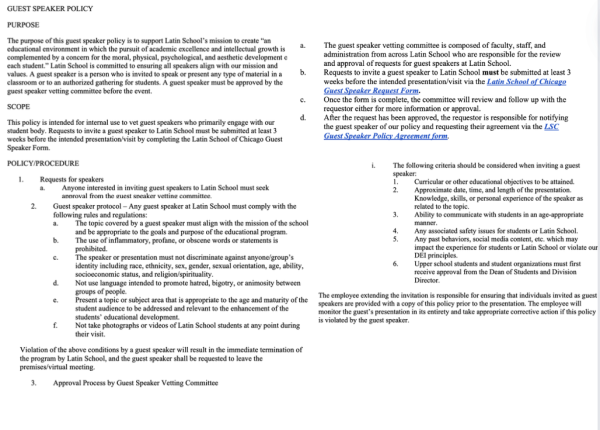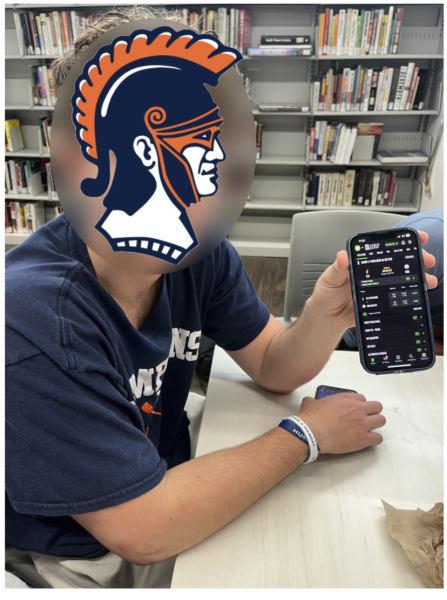The Danger of Politics in Education: The ‘Beloved’ Bill
Juniors in American Families, an English elective, read and analyze Toni Morrison’s Beloved each year. Taught by Molly Lemieux, the book serves as a foundational text for unpacking the nuances of race, gender, and memory within the nuclear family in the year 1873.
“I love teaching Beloved,” Ms. Lemieux said, “because not only is it a work of stunning creative genius but also because it so beautifully and unapologetically reveals the horrors and the truths of enslavement in the U.S. and many of the lasting systemic and cultural effects of enslavement.”
Ascher Cahn, a senior who serves as a teaching assistant for the class, said, “There are a lot of lessons that I have learned both from reading Beloved the first time and now teaching it that I think are incredibly valuable.”
Current student in the course Alena Brandt, a junior, said, “I have really loved reading Beloved. Toni Morrison’s style of writing paired with deep, sensitive topics makes the book so interesting.”
Despite students’ high regard for Beloved, the Virginia House of Representatives in 2016 introduced a bill that would require public school teachers to notify parents when their students were assigned readings from texts such as Beloved that contained sexually explicit content. The state’s Democratic governor at the time, Terry McAuliffe, vetoed the bill. Amid the 2021 Virginia Governor’s race, though, the Beloved bill resurfaced as a main campaigning platform between Republican candidate Glenn Youngkin—who used education as a major pillar of his campaign strategy—and McAuliffe.
The push to censor what students can read in the classroom is symbolic of a larger attempt to politicize public schools.
Students appreciate reading the book not only for its literary detail, but also for its historical relevance. As Ms. Lemieux said, “In the foreword to the novel, Toni Morrison writes that she hoped ‘to make the slave experience intimate,’ and in doing so (successfully in my opinion), she offers to my students a different access point to history and a different framework for understanding and discussing that history, one more rooted in individual experience.”
Another student in American Families, junior Jackson Ballard, said, “Now that I am reading the book, I can say that I have a lot more information on slavery and the horrors that enslaved people had to live through.”
“The Beloved bill makes me nervous,” Jackson said. “By censoring this incredibly important book, we, as a nation, are depriving students of an accurate picture of how dark and brutal our history is.”
Alena added, “To me, the Beloved bill represents politicians and people in power being able to manipulate and censor difficult topics that are important and necessary to understand. It is also disappointing that students would be deprived of some of the best literature just because it includes explicit content that parents deem unacceptable.”
When asked about the dangers of politicizing the education system, Ms. Lemieux referenced a Washington Post article written by Farah Jasmine Griffin in which Griffin said, “Efforts to ban works like Beloved undermine democracy, even if they aren’t intended to. Encouraging students to encounter new and different contexts provides an opportunity for them to understand experiences beyond their own, forces them to confront the evil that human beings can do to each other as well as the decency, mercy, and love we are capable of offering one another.”
Similarly, Ascher added, “Given that we are often taught that after the Emancipation Proclamation everything was great for all when in reality that was obviously not the case, in passing this bill, we would be denying students an accurate understanding of the lives of formerly enslaved people at the time.”
In light of Youngkin’s gubernatorial victory in the recent Virginia election, the fate of the Beloved bill is unclear. However, students remain adamant that politicians must stay out of the classroom.
Jackson concluded by saying, “Once politicians start controlling school curricula and deciding what is or isn’t worth teaching, the opinions of politicians become impressed within the students, and we get a borderline mind-controlled society who were all raised to believe in one politician’s ideals.”

Nina Burik ('22) is a senior at Latin and is looking forward to serving as Standards Editor this year. In her time on The Forum staff, she has covered...
















































